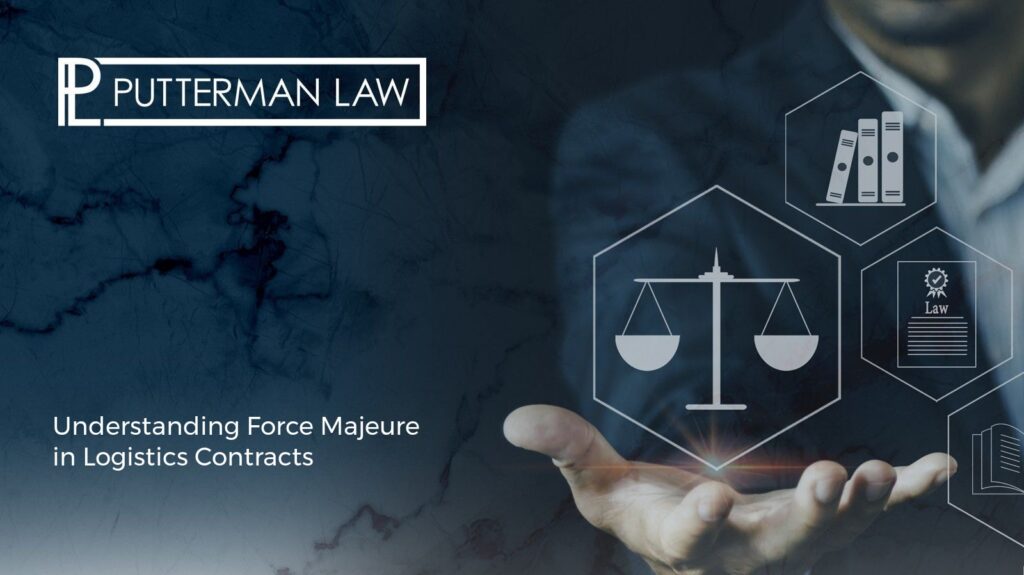Force Majeure, a term derived from French contract law, refers to unforeseeable circumstances that prevent someone from fulfilling a contract. At its core, it signifies an event or effect that can be neither anticipated nor controlled, thereby excusing parties from performing their contractual obligations. As a legal concept, it is crucial for parties involved in supply-chain and logistics contracts to understand its implications fully.
Common Triggers
Common triggers for Force Majeure clauses typically include events such as natural disasters (floods, earthquakes, hurricanes), pandemics like COVID-19, and government actions that impose restrictions or create barriers to fulfilling contractual duties. By anticipating these events, businesses can better safeguard their interests and remain compliant with legal obligations.
Importance in Logistics and Supply-Chains
In the realm of logistics and supply chains, Force Majeure holds special significance. These industries are inherently vulnerable to disruptions caused by environmental and geopolitical factors. For companies operating within these sectors, incorporating robust Force Majeure clauses can mean the difference between weathering an unexpected storm and facing debilitating operational and financial setbacks.
Legal Framework and Jurisprudence
Federal and State Guidelines
The governance of Force Majeure clauses often falls under both federal and state laws. At the federal level, various regulations provide a backdrop against which these clauses are interpreted. State laws, however, can differ significantly, influencing how these contractual terms are enforced. Understanding both federal and state guidelines is essential for businesses aiming to create enforceable and compliant contracts.
Case Law Examples
Several landmark cases have shaped the legal landscape surrounding Force Majeure clauses in logistics and supply-chain contracts. These cases offer valuable insights into how courts interpret and enforce these clauses. Reviewing case law helps companies understand precedents and better draft their contracts to withstand legal scrutiny.
Key Legal Terms
Force Majeure clauses often involve complex legal definitions that can be pivotal in their application. Terms like “impracticability” and “impossibility” are frequently used to describe situations where performance of contractual duties is hindered or made impossible. Clarifying these terms is crucial for minimizing ambiguities and ensuring that the clauses are enforceable.
Identifying and Mitigating Risks
Risk Assessment
Effective risk assessment is the first step in identifying potential triggers for Force Majeure clauses. Companies need to conduct thorough analyses to pinpoint vulnerabilities and anticipate events that could disrupt their operations. Proactive risk assessment can significantly mitigate the impact of Force Majeure events.
Contractual Provisions
Every Force Majeure clause should include essential elements designed to protect business interests. This includes detailed descriptions of triggering events, protocols for notification, and clearly defined obligations and rights for both parties. Well-drafted provisions can provide a vital safety net in times of crisis.
Business Continuity Plans
Having a robust business continuity plan is indispensable for maintaining operations during a Force Majeure event. These plans should outline strategies for resource allocation, alternative supply routes, and communication protocols. Businesses that are well-prepared can navigate disruptions more effectively while minimizing
The Impact of Force Majeure on Supply Chains and Logistics
Case Studies
The COVID-19 pandemic serves as a stark example of how Force Majeure clauses can dramatically disrupt logistics and supply chains. Various ports worldwide experienced delays due to mandatory quarantines and labor shortages. Similarly, hurricanes and tsunamis have historically blocked key shipping routes, exacerbating delays and creating a ripple effect in the supply chain.
Industry-Specific Challenges
Challenges under Force Majeure clauses can be particularly daunting for certain sectors. For instance, the manufacturing industry often relies on just-in-time inventory systems. When natural disasters strike, production lines can come to a standstill. In retail, sudden interruptions in the supply chain can lead to empty shelves and lost sales. However, the transportation sector might face different hurdles, such as route changes or increased operational costs due to unforeseen obstacles.
- Manufacturing: Disruptions to raw materials and production schedules.
- Retail: Delays leading to stockouts and unsatisfied customers.
- Transportation: Increased fuel costs and rerouting complexities.
Economic Consequences
Force Majeure events can inflict substantial financial damage on businesses. Operational delays can translate to steep financial losses, affecting a company’s bottom line. Furthermore, the broader economy often feels the ripple effects of disrupted supply chains. We recommend that our clients consider including detailed Force Majeure provisions in their contracts to mitigate these risks.
Navigating Force Majeure Litigation
Legal Recourse
If a Force Majeure event leads to a breach of contract, legal recourse becomes necessary. We guide our clients through the complexities of proving a Force Majeure event. Documentation is critical: businesses must keep meticulous records of all communications and circumstances. Courts will assess whether the event genuinely falls under the Force Majeure clause stipulated in the contract.
Dispute Resolution
Dispute resolution is often the next step when Force Majeure clauses are invoked. Mediation and arbitration provide alternative avenues to resolve these disputes. These methods are generally quicker and more cost-effective than traditional litigation. We ensure that our clients understand all available options and choose the most practical one.
- Mediation: A facilitated negotiation process to reach a mutually agreeable solution.
- Arbitration: A binding resolution process with a neutral third party.
Defending Against Claims
Businesses may find themselves needing to defend against claims that they improperly invoked a Force Majeure clause. One effective defense strategy involves proving that all reasonable measures were taken to mitigate the impact of the event. Additionally, clearly documenting the causal link between the Force Majeure event and the inability to fulfill contractual obligations will strengthen the defense. We help our clients prepare robust arguments and gather all necessary evidence to support their case.
Did you know? The term “Force Majeure” comes from French law, meaning “superior force” and is crucial for managing unpredictability in supply-chain and logistics contracts.
Proactive Steps to Protect Against Future Force Majeure Events
Enhancing Contractual Protections
Given the widespread disruptions caused by events such as the COVID-19 pandemic, it is now more critical than ever to review and update your Force Majeure clauses. We recommend tailoring these clauses to reflect specific risks pertinent to your industry. For example, in the logistics and supply chain sector, it is crucial to include provisions for port strikes, transportation shutdowns, and international trade restrictions. Ensuring that your contracts clearly define what constitutes a Force Majeure event can help protect your business interests effectively.
Developing Comprehensive Business Continuity Plans
Business continuity planning is essential for mitigating the risks associated with Force Majeure events. A robust plan should address various scenarios, including natural disasters, global pandemics, and significant geopolitical shifts. By identifying critical business functions and establishing alternative operational strategies, companies can ensure they remain resilient during challenging times. Regularly updating and testing these plans will help maintain operational readiness.
Strengthening Supplier Relationships
Strong supplier relationships can be a vital asset during Force Majeure events. Open communication and mutually beneficial agreements can create a more resilient supply chain. Consider involving your suppliers in your risk assessments and business continuity planning processes. Written agreements that specify how Force Majeure events will be managed collaboratively can further mitigate disruptions.
Why Legal Guidance Is Essential
Navigating the complexities of Force Majeure clauses requires specialized legal expertise, especially in sectors with intricate supply chains like logistics and transportation. Our team at Putterman Law specializes in transportation law and can provide the guidance needed to craft comprehensive Force Majeure clauses and business continuity plans tailored to your specific needs.
Moreover, we can assist in dispute resolution, helping you understand your legal recourse in the event a Force Majeure clause is triggered. Whether through mediation, arbitration, or litigation, our goal is to help you resolve disputes efficiently and effectively.
Future-Proof Your Contracts Today
In an unpredictable world, being prepared for Force Majeure events is not just prudent—it’s essential. Protect your business interests and ensure operational continuity by proactively addressing potential risks. Contact us at Putterman Law to learn how we can assist you in fortifying your contracts and developing sustainable business continuity plans.
Thank you for trusting us to guide you through these complex legal landscapes. We are here to support you in every step of your journey towards resilient and robust business operations.
FAQ
What constitutes a Force Majeure event in supply-chain and logistics contracts?
A Force Majeure event in supply-chain and logistics contracts typically includes unforeseen occurrences beyond the control of parties involved, such as natural disasters like hurricanes or earthquakes, pandemics like COVID-19, labor strikes, wars, or governmental actions prohibiting or impeding contractual performance. Our expert attorneys at Putterman Law can help determine whether an event qualifies as Force Majeure under your specific contract terms.
How can businesses mitigate risks associated with Force Majeure events?
Businesses can mitigate risks by conducting thorough risk assessments, updating business continuity plans, and strengthening supplier relationships. Additionally, it’s prudent to tailor Force Majeure clauses in contracts to address potential industry-specific disruptions. Our legal team at Putterman Law is available to guide you through these processes, ensuring that your interests are robustly protected.
What steps should a business take if a Force Majeure event leads to a breach of contract?
In the event of a breach due to Force Majeure, businesses should first review the specific terms of their contract to confirm the applicability of the Force Majeure clause. Subsequently, open communication with the affected party is crucial to seek a resolution. If disputes arise, please consult with us at Putterman Law; we are prepared to assist you with legal recourse, including mediation, arbitration, or litigation based on your contractual provisions and the circumstances.
How can companies future-proof contracts against Force Majeure events?
To future-proof contracts against Force Majeure events, companies should ensure that their Force Majeure clauses are meticulously drafted, covering a comprehensive range of potential events and clearly defining the relief and obligations for each party involved. We recommend seeking our legal expertise at Putterman Law to draft and review these clauses, as this will help your business stand resilient in the face of unexpected events.
Why is it essential to have legal guidance when dealing with Force Majeure clauses?
Legal guidance is essential when dealing with Force Majeure clauses due to the complexity and potential for significant financial impact. Our specialized expertise in transportation and logistics law ensures that your Force Majeure clauses are effectively crafted and that your business continuity plans are thorough. We provide support through a deep understanding of the legal frameworks to navigate any disputes arising from Force Majeure events efficiently.






